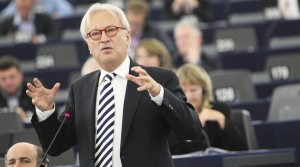For the chief negotiator (member of European People’s Party) requests from the House were accepted and yet his own party member, the German Böge, resigned as a sign of controversy. Swodoba (Socialists & Democrats): “We do not accept blackmail from the Council.” Verhofstadt (Alde): “There will not be a qualified majority”

No sooner than they announced the long-awaited agreement on the EU’s Multi-annual financial framework (Mff) there was friendly fire from the European Parliament. “We won’t give into the Council’s blackmail – thundered Hannes Swoboda, President of the S&D group – We deeply regret that the Council didn’t make a more substantial effort toward our demands.”
The informal agreement was reached Wednesday evening by the Irish Deputy Prime Minister and by the European Parliament’s chief negotiator, the French Alain Lamassoure of the EPP who exulted: “Priorities from Parliament have been taken on board.” But it seems Lamassoure “speaks only for himself at the moment,” according to what was referred by Parliament sources.
The same chief negotiator, not surprisingly, in yesterday’s press release put his hands up affirming: “Parliament is not in a position to give its final approval at this stage, given that the positions of the political groups in the negotiating team are different.” In fact, the Socialist negotiator, Ivailo Kalfin, affirmed: “The Council announced that there was an agreement on text that we have not seen.” And not only is there dissent between the political groups but also within the groups where the positions seem very different and thus the German Reimer Böge, a co-party member of Lamassoure, resigned from his position as House negotiator in opposition to this agreement that he deems inadequate. This choice caused uproar since the deputy went not only against his own political group but also against Angela Merkel, his President and co-party member in Germany.
ALDE liberals, the third largest group of the Euro Parliament also removed their shields. For their President, Guy Verhofstadt, who is one of the fiercest critics of the text that was approved by the European Council, “there is no deal.” The liberal also sent a clear warning to the 27 member states: “I remind you that in order to approve the Mff there must be a qualified majority in Parliament,” a majority that without socialists and liberals, to which the Lefts and the Greens certainly will be added, can never be reached. Alda Sousa, coordinator of the European United Left/Nordic Green Left on the Budget Committee has already made it clear that in her opinion, “until now not even the requirements for negotiations on the multi-annual financial framework have been met,” let alone voting for them.
Among the Italians, Giovanni La Via, the head of delegation of the People of Freedom in Brussels, is in favor of the agreement. “It is an example of responsibility to consent to the go ahead to a regular start of all European policies essential for our economy’s comeback – he says – The flexibility of the budget was the main point of contention with the Council. The European Commission will review the budget in 2016 with a type of revision at half term when, in the prospect of overcoming the economic crisis, they could invest in new resources.” There are about 47 legislative procedures at stake, among which the Common Agricultural Policy (CAP) for which negotiations are stalled due precisely to lack of agreement on the budget. All these packages, if the multi-annual financial framework text is not approved, cannot become operative.
On the other hand Claudio Morganti, Coordinator of the Budget Committee for the Europe of Freedom and Democracy group, is opposed. According to him “Parliament requires that a budget already conceived at a lower rate can be available in full to support growth, given the time of crisis, while the Council is so determined to cut further on already proposed cuts, about which Parliament did not express disapproval.”
Alfonso Bianchi


![Una donna controlla le informazioni sul cibo specificate sulla confezione [foto: archivio]](https://www.eunews.it/wp-content/uploads/2014/12/Etichette-alimentari.jpg)


![Ragazza in biblioteca. Nell'Ue chi studia non lavora e neppure cerca. In Italia funziona ancor più così [foto: Tulane University, Wikimedia Commons]](https://www.eunews.it/wp-content/uploads/2024/11/Girl_in_the_Library_3638661587-350x250.jpg)



